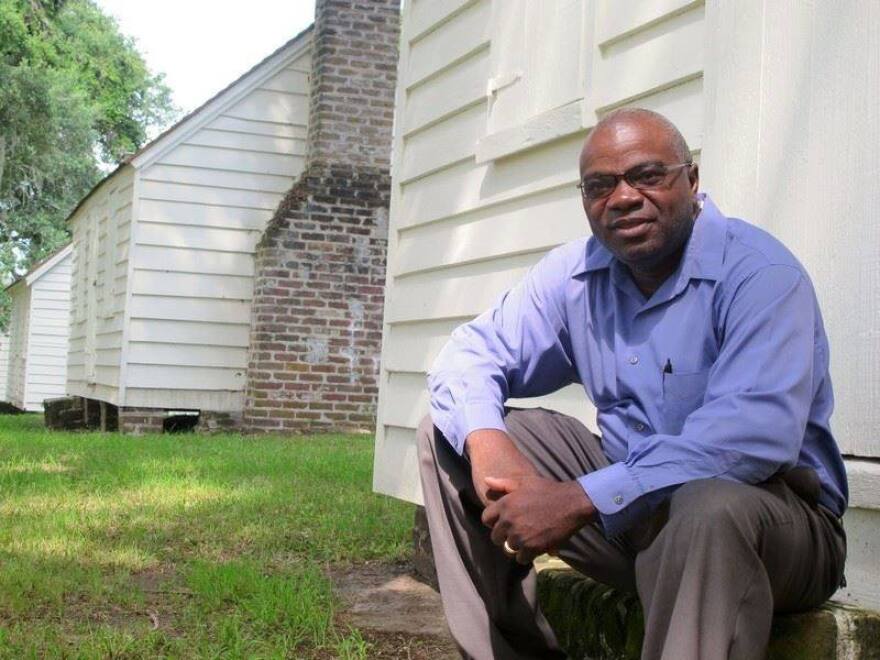Earlier this month, author and former congressional candidate Saira Row tweeted a picture of a two star review of the McLeod Plantation Historic Site in Charleston, South Carolina. It read:
“My husband and I were extremely disappointed in this tour. We didn’t come to hear a lecture on how White People treated slaves.”
By doing so, Row re-ignited an ongoing debate about how America teaches history, with a specific focus on how historic sites and artifacts include or exclude the history of enslaved people and the legacy of slavery.
In Louisville, the debate’s most visible aspect has centered around the John B. Castleman statue, but Jefferson County is also home to Locust Grove, a plantation that may be one of Louisville’s most beautiful — and problematic — sites.
Enter Joe McGill, an educator, Civil War reenactor, and descendant of enslaved people who will spend the night at Locust Grove this Friday, resting his head in the same place as an unknown number of enslaved people did in the days before slavery ended. Additionally, he invites the public to join him, and have a conversation about the experience and history.
Spending the night in historical sites tied to slavery is the central practice of McGill’s “The Slave Dwelling Project,” a nine-year-old endeavor that drew its initial inspiration from McGill’s travels to historic sites.
“It was what I was not seeing in the antebellum sites that I visited, [where I would] learn about the nice beautiful big house, and all the people that would live within those four walls,” McGill said. “I was not learning about the people from whom I derive my DNA, the enslaved people.”
McGill decided to try to do something to rectify that situation, and started his project with a series of phone calls, to explore the feasibility of his nascent venture.
“My solution to that was to find out where these places existed, contact them,” he said. “When I started making calls...most people got it. A few didn't, and they sent me on my way.”
According to McGill, in the nine years he has been doing this work, a lot has changed. In that time he’s visited 24 states — Kentucky will make that 25 — and more than 150 historic sites.
“I've seen an evolution. I've seen more of a willingness,” he said. “Nine years ago it was me calling folks trying to convince them of this crazy idea I had. Now it's the opposite.”
In that time, McGill has also experienced his own evolution, coming to believe that the scope of his project is much broader than he originally intended.
“It was like I had blinders on. I was operating on the history that was disseminated to me. And that history only had slavery as it existed on southern plantations,” said McGill.
That view of history leaves out slavery in the North, in the West, and in population centers and cities. McGill cited the city of Charleston, South Carolina; the state’s population of enslaved people made up more than half the overall state population by the year 1860.
“And all those people were not on plantations,” he said. “Some of those people were in the city of Charleston, servicing those nice people's home.”
Locust Grove’s Marketing and Communications Director Hannah Zimmerman says reevaluating the way history is presented is crucial to Locust Grove’s mission.
“Knowing about the men, women, and children who were enslaved here is just as important to our history as knowing about the lives of the Croghan family,” she said. “Slaves built the house and outbuildings, planted and harvested crops, cooked meals, helped raise the eight Croghan children who grew up here.”
In addition to hosting guests like McGill, Locust Grove has regular programing that attempts to fulfill that mission.
“Interpreters portraying enslaved individuals have assisted us in creating a more complete picture of life at Locust Grove in the 19th century and by bringing life to the biographies our researchers have uncovered,” Zimmerman said.
McGill’s typical approach to events varies from site to site. Sometimes he is able to sleep in the actual buildings where enslaved people slept. Other times, like his visits to presidential plantations Monticello and Montpelier, McGill has to settle for buildings that have been recreated. Other times there is nothing, and he pitches a tent.
In the ideal situation — an authentic original building — McGill can sometimes do a lot more than sleep. He tries to find palpable ways to help attendees at his presentations connect with the past.
“If there are authentic bricks, I want to see them, because sometimes in the process of making these bricks, fingerprints were left,” he said. “To me, that's the sign of our ancestors reaching back to us, saying, ‘We were here. Tell our stories.’”
Knowing the sheer number of places he thinks the historic record needs to be expanded to include the history of its enslaved people, McGill doesn’t believe he will ever “finish” the Slave Dwelling Project, but he also doesn’t ever plan to stop.
“As long as this body allows me to go lay my head in these places, I will.”
Friday night’s event, “The Slave Dwelling Project: Campfire Conversation and Overnight” is already sold out, but Saturday’s event “The Slave Dwelling Project: Continuing the Conversation with Joe McGill” still has tickets available. That program is scheduled for Saturday, August 24, 1:30 pm. Advanced reservations are required for this program. Tickets: $12 for members and students/$15 for non-members. Please call 502-897-9845 for reservations.

